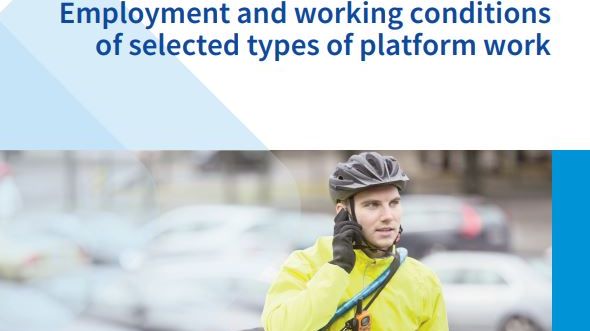
Blog post -
Platform work – Breaking barriers or breaking bad?
Author: Irene Mandl
If you’ve ever ordered a taxi through an app, taken a pizza delivery from a guy on a bike or searched a website for a plumber to unblock your drain, you’ve probably witnessed platform work first hand. The ability to order a service online is quickly becoming a commonplace and platform work is clearly filling a gap in the market. But this way of working is challenging existing labour laws and regulations protecting workers.
In the abstract, platform work is the matching of supply and demand for paid work through an online platform. In practice, most people are likely to have encountered it through big online platforms such as Uber, Deliveroo or Amazon Mechanical Turk. This is a new form employment that began to emerge in Europe about a decade ago. And while it is still small in scale – estimates of the percentage of workers employed by platforms are in single digits – it is growing relentlessly. New platforms are constantly starting up, changing their business models and sinking into obscurity. But some have gained a solid foothold and look likely to be around for some time to come.
Increasing numbers of workers are attracted to working this way – for some, out of necessity as they have no alternative employment opportunities; for others, it’s an easier way to get work than looking for a standard job. Some use it as a way to earn extra income on the side – perhaps to pay for a holiday or buy a new car. And some do it simply because they enjoy it – like the designers who use it to showcase their creativity online. Many try it once and never do it again, others do it regularly but not intensively, and a small proportion of Europeans do platform work as their main income source.
It is growing thanks in part to the ever-expanding variety of tasks being mediated through platforms. At one end are the online micro-tasks – click-work – that do not require particular skills, such as tagging photos. At the other are larger projects commissioned from highly skilled professionals. Work can be delivered online (like the design of a logo or translation of a text) or on-location (like transport services or household maintenance). So not all platform work is the same, and this diversity needs to be taken into account in any assessment of its positive and negative sides.
Good or bad?
The tendency of platform work to encroach on existing areas of business has sparked debate in many EU member tates and attracted media attention – the backlash of food-delivery riders against platforms like Deliveroo or Foodora or of traditional taxi companies against Uber have been widely reported. Platform work does not fit into traditional economic and labour market structures, and is challenging the institutions and legislation built around them. Courts in various countries have been asked to decide whether or not this business model creates unfair competition for traditional operators and whether it circumvents labour law. While some court rulings have been published, none is yet final and may still be appealed.
Eurofound: Court rulings on platform work
Trade unions across Europe are concerned about the working conditions of workers engaged in this type of work. Their income is often low and unpredictable, working time can be long and unsocial, health and safety might not be properly addressed, and workers are often not sufficiently covered by the state’s social protection system. While such downsides are evident in some types of platform work, there are upsides too. For instance, workers who encounter discrimination in the traditional labour market can avoid it in an online environment. Platform workers can take more control of their work, work flexibly and improve their work–life balance. There is also evidence that people use it to gain work experience and to develop their skills, improving their job prospects.
Eurofound’s research into the working conditions of platform workers has found significant differences in various aspects of job quality across the types of work being performed. What they all have in common is that none of them is perfectly good nor completely bad. Each has strengths that can be built upon and weaknesses to be tackled.
Eurofound: Employment and working conditions of selected types of platform work
Capitalising on the good
Considering how rapidly platform work has developed in Europe over the last few years, it is safe to assume that this employment form is going to continue to grow. With this in mind, several stakeholders have started initiatives that aim to foster the positive aspects of platform work or to address its negative features. Although these initiatives are rather small, fragmented endeavours whose success cannot yet be judged, one thing is clear – each initiative has to be tailor-made to address a specific challenge.
For example, measures to ensure decent working conditions or to establish effective dispute-resolution mechanisms are more relevant to situations where the platform is dominant and the work is low-skilled and delivered in person – food-delivery and taxi services are typical examples. On the other hand, initiatives to clarify taxation issues are more important for professionals and freelancers who use online platforms to access higher-skilled work.
Eurofound: Initiatives on the platform economy
Platform work is neither good nor bad – it just is. We need to adapt to this reality by finding ways to capitalise on the positive while at the same time counteracting the negative. This needs to be done in a differentiated way, taking account of the great variety in platform work. One-size solutions simply will not fit all.
More on platform work |



